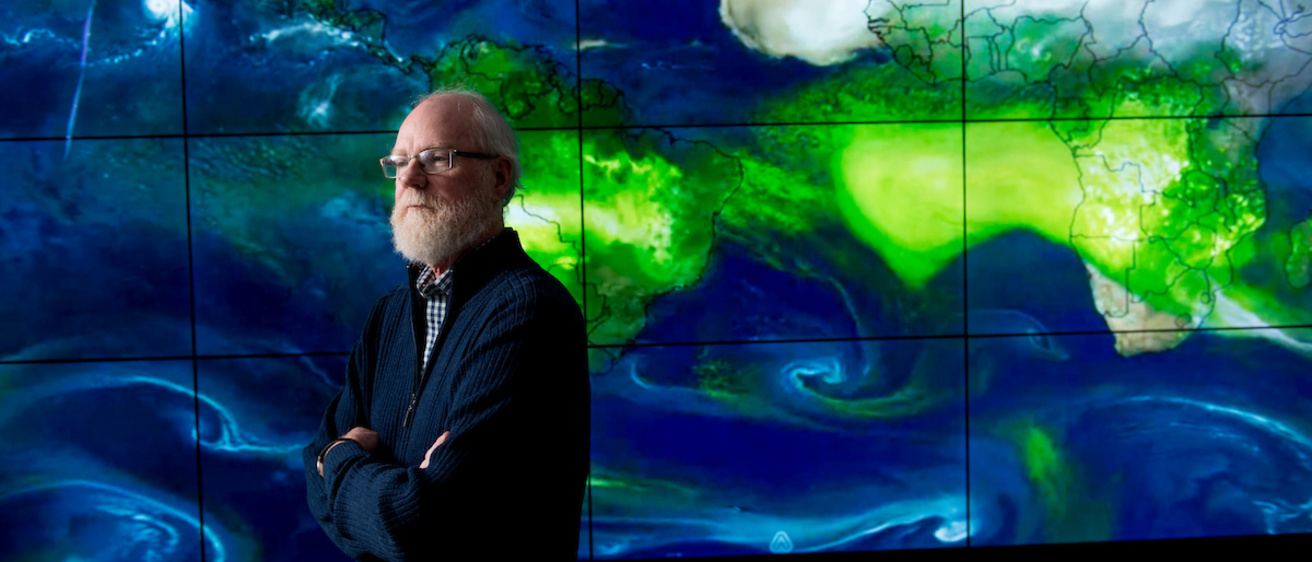Growing up in a small town in Illinois, Gregory Carmichael had no idea that a career in engineering would take him all over the world while researching one of the most pressing issues facing our planet.
For nearly 40 years, the Karl Kammermeyer Professor of Chemical and Biochemical Engineering at the University of Iowa has been studying air quality and the worldwide impact of air pollution.
Carmichael, who also serves as director of the UI Informatics Initiative, will deliver the 34th annual UI Presidential Lecture, “What Goes Around, Comes Around: The Global Reach of Air Pollution,” at 3:30 p.m. Sunday, Feb. 19, in the fourth-floor assembly hall of the Levitt Center for University Advancement.
Carmichael earned a BS in chemical engineering from Iowa State University in 1974 and a PhD from the University of Kentucky in 1979. A member of the UI faculty since 1978, Carmichael has not deviated much from the topic that fascinated him in his graduate studies.
“I still have great fun doing this,” he says.
Co-director of the UI Center for Global and Regional Environmental Research since 1991, Carmichael has won numerous awards, including the American Institute of Chemical Engineers Lawrence K. Cecil Award in 2012, NASA Group Achievement Awards in 2005 and 2009, and the Regents Faculty Recognition Award in 1998.
Iowa Now caught up with Carmichael to discuss his upcoming lecture and the work that has spanned his entire career.
What are you hoping to convey to people during your lecture? What do you hope they might take away from it?
The main point I wish to make is to remind the audience that we all live in one environment. Even something like air pollution, which we have traditionally felt has been a local or regional problem, is really a global problem, and it is having a profound impact on the health of the planet—largely human health and ecosystem health. I also plan to point out that those same pollutants play a big role in climate change as well. There’s an opportunity to deal with both air pollution and climate change at the same time, and move us in a better direction for sustainability.
What inspired you to pursue this line of research, and what have been some of your key findings?
At the time I was doing my graduate studies, acid rain was emerging as a big problem. That was really the first air pollution problem that demonstrated to people that we could have an impact beyond our local environment.
In engineering, it’s all about defining the problem. In the 1960s, the immediate problem of local air pollution was defined, but they didn’t foresee that the solution they took (building taller smokestacks to dilute air pollution locally) ignored another, bigger problem that could arise (pollutants spreading to other areas). So I became interested in the regional reach of air pollution.
At Iowa, I started to explore regional pollution in East Asia and began to see that pollution leaving the Asian continent wasn’t just stopping and impacting the air quality around China, Japan, and Korea but that it was possible that it was being transported from one continent to another. So, we expanded our scope of study and wrote some papers saying that it does have an intercontinental impact and could have a larger impact over time as emissions grow in Asia.
We have done a lot of work on this topic over time, and this long-range transport of pollution is now being taken into consideration in the management of U.S. air quality and in international discussions. Wherever the emissions are occurring, they have an impact not only locally but globally as well.
What are some of the highlights of your work?
The most fulfilling and the most surprising is the road this topic has taken me on. It’s not that I had small horizons, but I had no idea I’d be doing this much international work. I’ve certainly enjoyed the fact that I’m doing really neat, cutting-edge science and that what we’re doing is immediately practical, helping to inform policy makers and nations about the complexities of air pollution.
What are you most proud of in your career?
I’m certainly most proud of training my students. I’ve supervised many students and just by the nature of the field, both domestic and international students. To see them have wonderful careers and have an impact on their nations in terms of environmental issues or whatever path they’re taking, to see them grow, has been very rewarding. It has also been very fulfilling to see that our work linking air pollution and climate change is helping to advance national and international policies.
What does it mean to you to have been chosen to deliver the presidential lecture?
I feel very humbled. It’s a great honor and a great opportunity to share ideas about air pollution and the opportunities and challenges that it presents. I’m basically an optimistic person. We can make a difference, and we can change our course.
